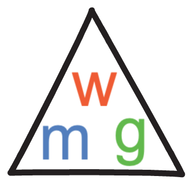Back to P5 Home
P5: Quiz 3 – Answers
P5: Quiz 3 – Answers
1)
a) Mass is the amount of stuff that is in an object and it is measured in kilograms (kg).
b) Weight is the force of gravity pulling an object towards something. Weight is measured in newtons (N)
2)
a) weight = mass x gravitational field strength
w = m x g
a) Mass is the amount of stuff that is in an object and it is measured in kilograms (kg).
b) Weight is the force of gravity pulling an object towards something. Weight is measured in newtons (N)
2)
a) weight = mass x gravitational field strength
w = m x g
b) Direct proportion (weight and mass are directly proportional to each other)
c) The centre of mass of an object is a single point in an object where all of the mass is concentrated at
3)
a) The object’s mass will be the same on the earth and the moon; it will always be 15 kg
b) 147 N
c) 24 N
d) The weight of all objects will always be greater on earth compared to the moon. This is because the gravitational field strength is greater on earth (9.8 N/kg) compared to the moon (1.6 N/kg)
4) 13.72 N
5) 2.45 N
6) 6.5 kg
7) 106.21 N
8) 2.3 kg
9) 11.7 N/kg
10) 10.5 N/kg
c) The centre of mass of an object is a single point in an object where all of the mass is concentrated at
3)
a) The object’s mass will be the same on the earth and the moon; it will always be 15 kg
b) 147 N
c) 24 N
d) The weight of all objects will always be greater on earth compared to the moon. This is because the gravitational field strength is greater on earth (9.8 N/kg) compared to the moon (1.6 N/kg)
4) 13.72 N
5) 2.45 N
6) 6.5 kg
7) 106.21 N
8) 2.3 kg
9) 11.7 N/kg
10) 10.5 N/kg
Questions
1)
a) Define mass and give the units that mass is measured in.
b) Define weight and give the units that weight is measured in.
2)
a) Write the equation that links mass, weight and gravitational field strength.
b) Would you describe mass and weight as being directly proportional to each other, or inversely proportional to each other?
c) What is the centre of mass?
3) An object has a mass of 15 kg.
a) Will the object have the same mass on the moon and the earth?
b) Find the weight of the object on earth. The gravitational field strength on earth is 9.8 N/kg.
c) Find the weight of the object on the moon. The gravitational field strength on the moon is 1.6 N/kg.
d) Will the weight of all objects be greater on the earth or greater on the moon? Explain your answer.
4) A laptop has a mass of 1.4 kg. Find the weight of the laptop on earth. Use g as 9.8 N/kg.
5) A book has a mass of 250 grams. Find the weight of the book on earth. Use g as 9.8 N/kg.
6) An object on earth has a weight of 63.7 N. Find the mass of the object. Use g as 9.8 N/kg.
7) A rock on Jupiter has a mass of 4.3 kg. The gravitational field strength on Jupiter is 24.7 N/kg. Find the weight of the rock on Jupiter.
8) A rock has a weight on Mercury of 8.51 newtons. The gravitational field strength on Mercury is 3.7 N/kg. Find the mass of the rock.
9) An object has a mass of 16 kg and a weight of 187.2 newtons on Neptune. Find the gravitational field strength on Neptune.
10) The weight of a rock on Saturn is 49.35 newtons. The mass of the rock is 4.7 kg. Find the gravitational field strength on Saturn.
1)
a) Define mass and give the units that mass is measured in.
b) Define weight and give the units that weight is measured in.
2)
a) Write the equation that links mass, weight and gravitational field strength.
b) Would you describe mass and weight as being directly proportional to each other, or inversely proportional to each other?
c) What is the centre of mass?
3) An object has a mass of 15 kg.
a) Will the object have the same mass on the moon and the earth?
b) Find the weight of the object on earth. The gravitational field strength on earth is 9.8 N/kg.
c) Find the weight of the object on the moon. The gravitational field strength on the moon is 1.6 N/kg.
d) Will the weight of all objects be greater on the earth or greater on the moon? Explain your answer.
4) A laptop has a mass of 1.4 kg. Find the weight of the laptop on earth. Use g as 9.8 N/kg.
5) A book has a mass of 250 grams. Find the weight of the book on earth. Use g as 9.8 N/kg.
6) An object on earth has a weight of 63.7 N. Find the mass of the object. Use g as 9.8 N/kg.
7) A rock on Jupiter has a mass of 4.3 kg. The gravitational field strength on Jupiter is 24.7 N/kg. Find the weight of the rock on Jupiter.
8) A rock has a weight on Mercury of 8.51 newtons. The gravitational field strength on Mercury is 3.7 N/kg. Find the mass of the rock.
9) An object has a mass of 16 kg and a weight of 187.2 newtons on Neptune. Find the gravitational field strength on Neptune.
10) The weight of a rock on Saturn is 49.35 newtons. The mass of the rock is 4.7 kg. Find the gravitational field strength on Saturn.

